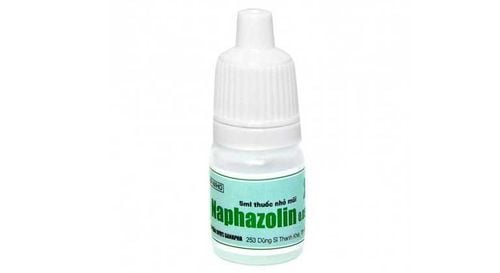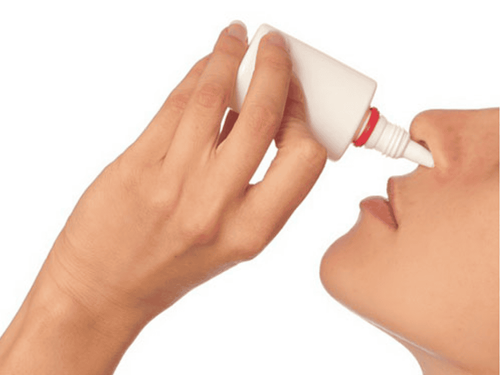This is an automatically translated article.
Nostravin Nasal Drops has the ingredient Xylometazoline 4mg, commonly indicated in the relief of nasal congestion caused by hay fever, nasal congestion caused by the common cold, upper respiratory tract allergies or even can be used in medical conditions. Sinusitis. This is an over-the-counter medicine.
1. General introduction of Nostravin nasal drops
Xylometazoline is an active ingredient that constricts blood vessels in the lining of the nose. Xylometazoline is used to avoid nasal congestion and relieve symptoms of the common cold.Xylometazoline works by acting on the alpha adrenergic receptors of the nasal mucosa to induce constriction, resulting in decreased blood flow and relief of nasal congestion. It also helps to get rid of any nasal discomfort that may be caused by dry air.
Nostravin Nasal Drops acts as a decongestant, so it constricts the mucous membranes of the nose by tightening the blood vessels. This will help relieve congestion and make it easier for the patient to breathe.
However, the relief of nasal congestion is only temporary, in some cases it can cause congestion again. It also temporarily relieves conjunctival congestion. If you use Nostravin Nasal Drops for a long time, nasal congestion tends to recur more often.

Xylometazoline được sử dụng để tránh nghẹt mũi và làm giảm các triệu chứng cảm lạnh thông thường.
2. Indications of Nostravin
Nostravin nasal drops are used to relieve the symptoms of nasal congestion in the following diseases: acute or chronic rhinitis, sinusitis, respiratory allergies, colds, headache or acute otitis media. Nostravin is also used to reduce swelling, facilitate an examination of the pharynx and pharynx before surgical treatment or diagnostic procedures, and can open blocked eustachian tubes in otitis media.3. Contraindications of Nostravin
Hypersensitivity to any component of the drug. Infant. Patients with angle-closure glaucoma should not receive Nostravin. Patients are sensitive to the pharmacological effects of adrenergic drugs. The patient is taking tricyclic antidepressants.
4. How to take medicine
Instill 1-2 drops into the nostrils, 2-3 times per day.
Nostravin should not be used for long-term treatment or instilled too much because these drugs can stimulate the nose to secrete more mucus or cause dryness and burning of the nasopharynx.
To prevent infection, do not use the container for more than one person and throw it away 15 days after first opening.
How to open the bottle:
Screw the cap down as far as possible to form a dispensing hole. Remove the cap and gently squeeze each drop into the nostril. Tighten the cap tightly after use.

Không nên dùng Nostravin để điều trị lâu dài hoặc nhỏ thuốc quá nhiều.
5. Nostravin side effects
Serious reactions rarely occur when used topically at the indicated dosage. Some side effects often appear but transient such as irritation of the nasal mucosa, dryness of the nasal mucosa, rebound congestion may occur with prolonged use of the drug. Some of the body's reactions may occur due to the drug absorbed into the throat such as increased blood pressure, tachycardia, arrhythmia.
Common: local irritation. Uncommon: burning, irritation, dryness or ulceration of mucous membranes, sneezing, rebound congestion with symptoms of redness, swelling and rhinitis with frequent and prolonged use. Rare: nausea, headache, dizziness, anxiety, palpitations, bradycardia and arrhythmia. Inform your doctor about any unusual reactions when using the drug. Precautions:
Extreme care should be taken in patients with hyperthyroidism, heart disease, hypertension, arteriosclerosis, prostatic hypertrophy or diabetes who are taking monoamine oxidase inhibitors. For children under 2 years old: must be prescribed by a doctor. It is not recommended to use it repeatedly and continuously to avoid re-occlusion. If you do not feel better after 3 days of continuous use, you should stop taking the drug and see a doctor.

Một số phản ứng của cơ thể có thể xảy ra do thuốc hấp thu vào họng như tăng huyết áp, nhịp tim nhanh, loạn nhịp tim.
6. Answers to some questions about Nostravin nasal drops
6.1. How long is the validity period?
The effects of this drug last for an average of 10 hours.
6.2. How long does it take to start working?
The effect of the drug Nostravin can be observed within 5-10 minutes after taking it.
6.3. Is the drug safe for pregnant women?
No effects of xylometazoline on the fetus have been reported. The drug is recommended for use during pregnancy only when the benefits outweigh the risks.

Thuốc chỉ được khuyến cáo sử dụng trong thời kỳ mang thai khi lợi ích nhiều hơn nguy cơ.
6.4. Can breastfeeding women take Nostravin?
It is not known whether xylometazoline is excreted in human milk. Therefore, this medicine should only be used on the advice of a doctor while breastfeeding.
6.5. Signs of an overdose
Excessive use or prolonged use, too often can cause irritation of the nasal mucosa, most commonly seen in children. Overdose in children mainly causes central nervous system depression, shock such as hypotension, hypothermia, tachycardia, sweating, coma.
7. Possible interactions when using Nostravin
7.1. Drug interactions: Linezolid, Sibutramine
Patients may require dosage adjustments and more frequent blood pressure monitoring when using this medicine together. Your doctor may prescribe an alternative medicine if the risk of side effects is high.
7.2. Interactions with other diseases
Benign prostatic hyperplasia: Nostravin nasal drops should be used with caution in patients with an enlarged prostate, prolonged use and high doses of the drug should be avoided. Report any difficulty urinating to your doctor. Cardiac Vascular Disorders: Nostravin nasal drops should be used with caution in patients with heart and vascular disease. Do not use Nostravin more than the dose recommended by your doctor. Diabetes: Nostravin nasal drops should be used with caution in patients with diabetes. Patients may require a dose adjustment and more frequent blood sugar monitoring while using this medication.
Please dial HOTLINE for more information or register for an appointment HERE. Download MyVinmec app to make appointments faster and to manage your bookings easily.
Reference sources: lybrate.com, traphaco.com.vn












